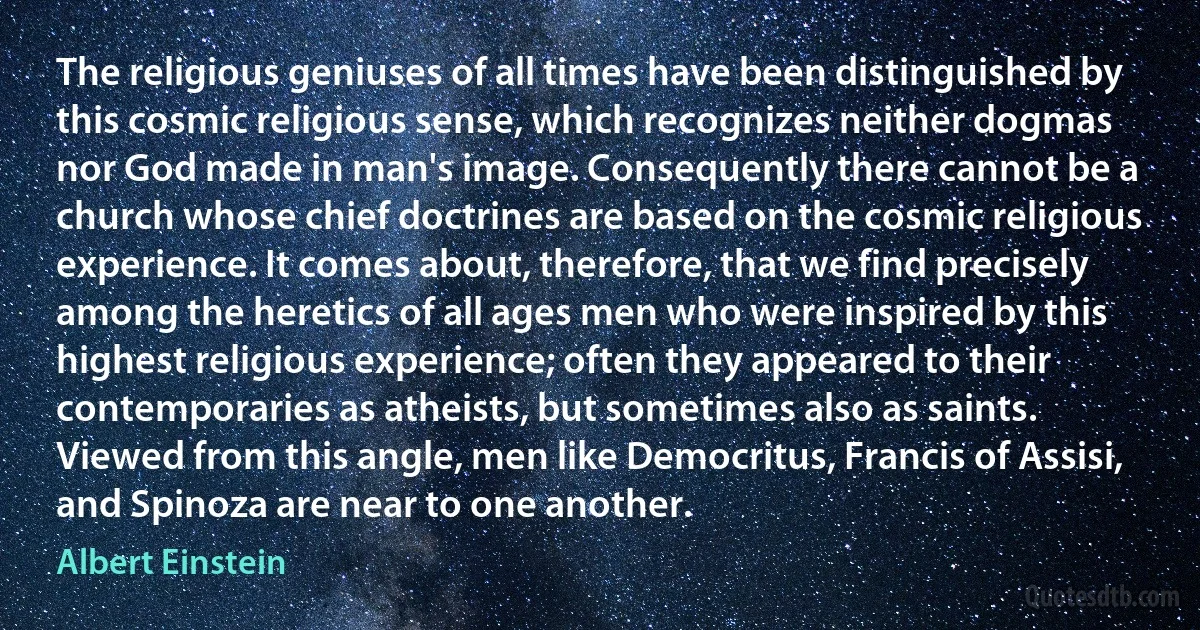Democritus Quotes
Oblivious of Democritus, the unwilling materialists of our day have generally been awkwardly intellectual and quite incapable of laughter. If they have felt anything, they have felt melancholy. Their allegiance and affection were still fixed on those mythical sentimental worlds which they saw to be illusory. The mechanical world they believed in could not please them, in spite of its extent and fertility. Giving rhetorical vent to their spleen and prejudice, they exaggerated nature's meagreness and mathematical dryness. When their imagination was chilled they spoke of nature, most unwarrantably, as dead, and when their judgment was heated they took the next step and called it unreal.

George Santayana
The movement of modern philosophy is back towards the position of the old Ionian philosophers, but strengthened and clarified by sound scientific ideas. If I publish my criticism on Comte, I should have to re-write it as a summary of philosophical ideas from the earliest times. The thread of philosophical development is not on the lines usually laid down for it. It goes from Democritus and the rest to the Epicureans, and then the Stoics, who tried to reconcile it with popular theological ideas, just as was done by the Christian Fathers. In the Middle Ages it was entirely lost under the theological theories of the time; but reappeared with Spinoza, who, however, muddled it up with a lot of metaphysics which made him almost unintelligible.

Baruch Spinoza
The natural philosophy of Democritus and some others, who did not suppose a mind or reason in the frame of things, but attributed the form thereof able to maintain itself to infinite essays or proofs of nature, which they term fortune, seemeth to me... in particularities of physical causes more real and better inquired than that of Aristotle and Plato; whereof both intermingled final causes, the one as a part of theology, and the other as a part of logic, which were the favourite studies respectively of both those persons. Not because those final causes are not true, and worthy to be inquired, being kept within their own province; but because their excursions into the limits of physical causes hath bred a vastness and solitude in that tract.

Francis Bacon
Thales thought that water was the primordial substance of all things. Heraclitus of Ephesus... thought that it was fire. Democritus and his follower Epicurus thought that it was the atoms, termed by our writers "bodies that cannot be cut up" or, by some "indivisibles." The school of the Pythagoreans added air and the earthy to the water and fire. Hence, although Democritus did not in a strict sense name them, but spoke only of indivisible bodies, yet he seems to have meant these same elements, because when taken by themselves they cannot be harmed, nor are they susceptible of dissolution, nor can they be cut up into parts, but throughout time eternal they forever retain an infinite solidity.

Vitruvius
At that moment Marx puts himself in a position where he becomes the necessary target of all who have a special interest in maintaining the old-similar to Democritus before him, whose work was burned by Plato and his disciples, the ideologues of Athenian slave aristocracy. Beginning with the revolutionary Marx, a political group with concrete ideas establishes itself. Basing itself on the giants, Marx and Engels, and developing through successive steps with personalities like Lenin, Stalin, Mao Tse-tung and the new Soviet and Chinese rulers, it establishes a body of doctrine and, let us say, examples to follow.

Che Guevara
But it is better to assume principles less in number and finite, as Empedocles makes them to be. All philosophers... make principles to be contraries... (for Parmenides makes principles to be hot and cold, and these he demominates fire and earth) as those who introduce as principles the rare and the dense. But Democritus makes the principles to be the solid and the void; of which the former, he says, has the relation of being, and the latter of non-being. ...it is necessary that principles should be neither produced from each other, nor from other things; and that from these all things should be generated. But these requisites are inherent in the first contraries: for, because they are first, they are not from other things; and because they are contraries, they are not from each other.

Aristotle
The trisection of an angle was effected by means of a curve discovered by Hippias of Elis, the sophist, a contemporary of Hippocrates as well as of Democritus and Socrates. The curve was called the quadratrix because it also served (in the hands, as we are told, of Dinostratus, brother of Menæchmus, and of Nicomedes) for squaring the circle. It was theoretically constructed as the locus of the point of intersection of two straight lines moving at uniform speeds and in the same time, one motion being angular and the other rectilinear.

Thomas Little Heath
All those... who discourse concerning nature, always subject a certain other nature of... elements, to the infinite... But no one of those who make the elements to be finite introduces infinity. Such, however, as make infinite elements, as Anaxagoras and Democritus, say that the infinite is continuous by contact. ...Rationally, too, do all philosophers consider the infinite as a principle; for it cannot be in vain, nor can any other power be present with it than that of a principle: for all things are either the principle, or from the principle; but of the infinite there is no principle, since otherwise it would have an end. ...it is also unbegotten and uncorruptible, as being a certain principle: for... end is the corruption of everything. ...It likewise appears to comprehend and govern all things, as those assert who do not introduce other causes beside the infinite... It would seem also that this is divine: for it is immortal and indestructible, as Anaximander says, and most of the physiologists.

Aristotle
And Democritus was an acquaintance of Leucippus. Democritus, son of Damasippus, a native of Abdera, conferring with many gymnosophists among the Indians, and with priests in Egypt, and with astrologers and magi in Babylon, [propounded his system]. Now he makes statements similarly with Leucippus concerning elements, viz. plenitude and vacuum, denominating plenitude entity, and vacuum non entity; and this he asserted, since existing things are con tinually moved in the vacuum. And he maintained worlds to be infinite, and varying in bulk; and that in some there is neither sun nor moon, while in others that they are larger than with us, and with others more numerous.

Hippolytus of Rome
In the philosophy of Democritus the atoms are eternal and indestructible units of matter, they can never be transformed into each other. With regard to this question modern physics takes a definite stand against the materialism of Democritus and for Plato and the Pythagoreans. The elementary particles are certainly not eternal and indestructible units of matter, they can actually be transformed into each other. As a matter of fact, if two such particles, moving through space with a very high kinetic energy, collide, then many new elementary particles may be created from the available energy and the old particles may have disappeared in the collision. Such events have been frequently observed and offer the best proof that all particles are made of the same substance: energy.

Werner Heisenberg
It was first surmised by the ancient philosopher, Democritus, that the faintly white zone which spans the sky under the name of the Milky Way, might be only a dense collection of stars too remote to be distinguished. This conjecture has been verified by the instruments of modern astronomers.

Robert Chambers (publisher born 1802)
My philosophical views approach somewhat closely those of the late Countess of Conway, and hold a middle position between Plato and Democritus, because I hold that all things take place mechanically as Democritus and Descartes contend against the views of Henry More and his followers, and hold too, nevertheless, that everything takes place according to a living principle and according to final causes - all things are full of life and consciousness, contrary to the views of the Atomists.

Gottfried Leibniz


